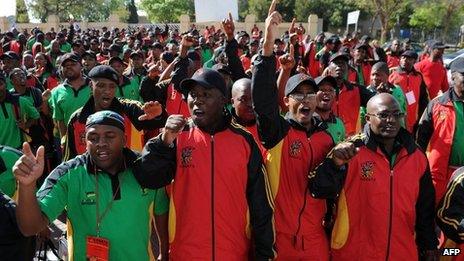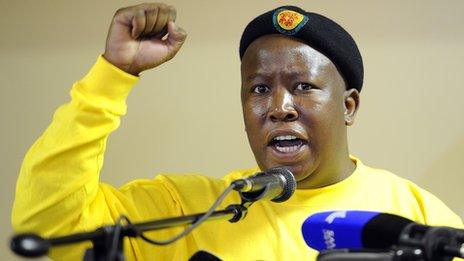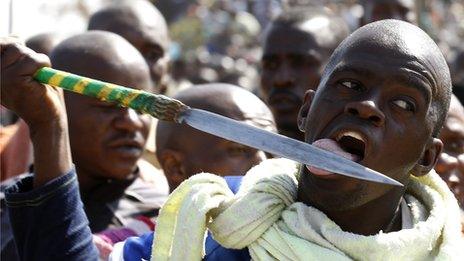Do unions have a future in South Africa?
- Published
- comments

It is being billed as a chance for some serious introspection, after the chaos and violence of the last few weeks here in South Africa.
On a hill outside Johannesburg thousands of labour activists are gathering for the national conference of the trade union federation Cosatu - against a backdrop of continuing unrest in the mining industry, and pointed questions about role and relevance of mainstream unions, and their cosy relationship with government.
The chaos "could spread", Cosatu's Secretary General Zwelinzima Vavi told me during a break.
"It depends on how we react. If we come here singing and doing nothing about the challenge it will spread, I have no doubt about that," he told me.
"We've got to change how we do things. We've got to embrace a new mind set and be on our toes," he said, implicitly acknowledging that the increasingly politicised and factional federation had strayed away from its core focus on wages and working conditions.
Will change happen?
The union movement has certainly been jolted by the turmoil sweeping through the platinum and gold mines around Johannesburg, which is being led by new, more militant unions or by the workers themselves.
Shop stewards from the giant National Union of Mineworkers (NUM) have been killed or threatened.
Populist leaders like the former African National Congress (ANC) Youth League leader Julius Malema have portrayed the NUM leadership as greedy fat cats, out of touch with the struggles of ordinary workers.
But for all Mr Vavi's talk of reform, the atmosphere at the congress struck me as rather stagnant - at least on day one - preoccupied with narrow internal politics and external finger pointing.
'Use laws of the land'
Gwede Mantashe, the gruff secretary general of the governing ANC and a former NUM leader, placed most of the blame for the unrest squarely at the feet of Lonmin and other mine owners.
The ANC "must avoid competing with demagogues and populists and exploiting a situation that should be returned to normal", he told me - expressing confidence in new moves by the security forces to "restore peaceful conditions" at the affected mines.
Earlier, President Jacob Zuma - whose chances of re-election were strengthened when his allies in Cosatu's leadership all kept their jobs unopposed - told the conference that "violence cannot become a culture of our labour relations. Workers and employers need to use the laws of the land".
As for the ANC - it was, he insisted, "the only force that has the interests of our people at heart… a disciplined force of the left, with a bias towards the working class and the poor.
"We should not listen to those who are making a career out of rubbishing our country and the gains of our national democratic revolution," said Mr Zuma.
South Africa's union movement has a long and illustrious history, but the nature of its relationship with government - as part of the tripartite alliance with the ANC and South African Communist Party (SACP) - is increasingly problematic as unemployment and inequality soar, and a growing, voiceless underclass turns towards the radical messages of populist leaders like Mr Malema.
"South Africa is a democracy with a legitimate government, but there is a disconnect," the political commentator Karima Brown told me.
The ANC may continue to win elections, she said, but given the inequality in the country, voters need to feel part of "a common development path".
And that is not happening. Hence the current, and relative success of Mr Malema.
"There is a weakness," Mr Vavi acknowledged.
"There is a vacuum being exploited by opportunists seeking to establish themselves.
"They choose the places were the unions are most vulnerable. Good luck to them.
"But in the long run, unions will get around the situation.
"People will realise that those who are championing their interests at this moment do not have their interests at heart," Mr Vavi asserted.
- Published12 September 2012

- Published23 August 2012

- Published9 July 2024

